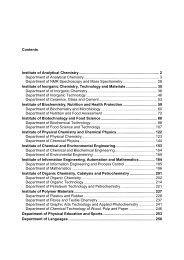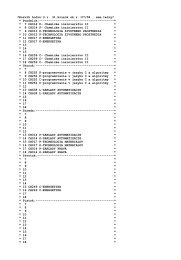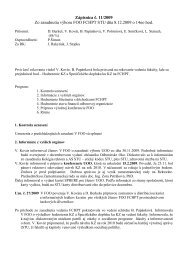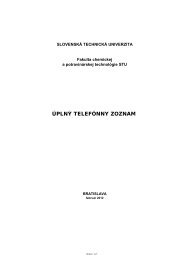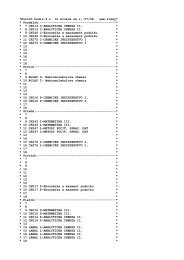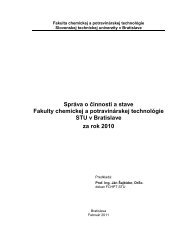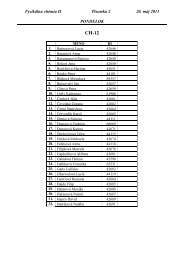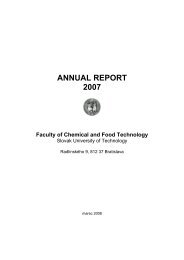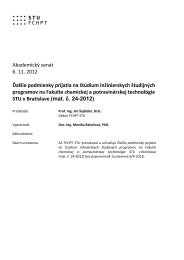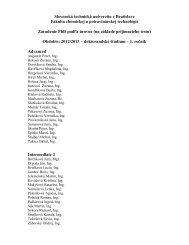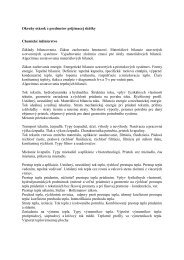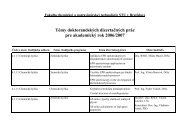rok 2006 - Fakulta chemickej a potravinárskej technológie ...
rok 2006 - Fakulta chemickej a potravinárskej technológie ...
rok 2006 - Fakulta chemickej a potravinárskej technológie ...
You also want an ePaper? Increase the reach of your titles
YUMPU automatically turns print PDFs into web optimized ePapers that Google loves.
signal transducers are investigated. Application of the electrochemical biosensors allows also in vitro generation<br />
and testing of potential metabolites and an investigation of mechanisms of risk species effects. This leads to the<br />
methodical development of new screening tools based on biosensors and bioelectronic chips. Possibilities of the<br />
biopolymers protection against a structural damage by environmental carcinogens using natural and synthetic<br />
antioxidants are studied too.<br />
Project duration: from 01.01.2005 to 31.12.2007<br />
F. APVV Project 20-015904: New biomaterials and biosensors for clinical use (Ján Labuda).<br />
Preparation of new biomaterials based on biopolymers and bioinorganic materials for clinical application as well<br />
as biosensors based on deoxyribonucleic acid (DNA) and lipoproteins (LDL) for direct use in clinical medicine.<br />
Project duration: from 01.01.2005 to 31.12.2007<br />
G. APVT Project 27-010304: Modification and optimalization of more sensitive measuring<br />
system of electrochemical DNA/SPE biosensor based on nanocarbon for the evaluation of<br />
effect of lipid compounds on DNA (Adriana Ferancová).<br />
The project aims at the study and evaluation of the activity of selected oxidation products of lipids on the DNA<br />
using new detection system based on carbon nanotubes modified DNA biosensor. Specific primary<br />
(hydroperoxides) and secondary lipid oxidation products can play an important role in the damage to DNA<br />
resulting in faster ageing process, neurodegeneraitve, carcinogenic or cardiovascular diseases.<br />
Project duration: from 01.07.<strong>2006</strong> to 15.12.<strong>2006</strong><br />
H. APVT Project 20-002904: Identification of suitable authentication markers and development<br />
of optimal analytical methods for their determination in selected food commodities (Ivan<br />
Špánik).<br />
The major objective of project is identification of potential authentication markers and development of suitable<br />
analytical methods and sample treatment procedures for their determination. The first part of project covers<br />
determination of qualitative and quantitative data about selected authentication markers (including enantiomeric<br />
composition of optically active compounds) in selected food commodities, mainly for those that are most<br />
frequently distributed in Slovakian market (juices, ketchup and honey). Obtained data will be summarized in<br />
authentication markers database, which will be tested on unknown samples of food commodities commonly<br />
distributed on Slovakian market. The second part of project is aimed on detailed mapping of chemical composition<br />
of food commodities that are included in Slovak Republic claim on Protected Denomination of Origin, Protected<br />
Geographical Indication or Traditional Speciality Guaranteed (mainly beverages) by available single-,<br />
multidimensional and hyphenated chromatographic systems.<br />
Project duration: from 01.01.2005 to 31.12.2007<br />
CH. NATO Project No SFP 977983 Minimisation of Pesticide Residues in Processed Products<br />
and the Environment (Eva Matisová).<br />
The project refers to pesticide science and more specifically to pesticide chemistry, and analytical methodology of<br />
residues. Pesticide residues undergo significant changes in chemical structure and concentration during food<br />
processing. The research work in the project is planned to contribute to better understanding of the effects of food<br />
processing on pesticide residues. Perfection of the analytical methodologies for detection and determination of<br />
pesticide residues at extremely low concentrations allowed in baby foods will be one of the scientific contributions<br />
of the project. Existing methods will be modified or new methods will be developed, distinguished by sufficient<br />
precision and reliability of determination of residues at or below the concentration level of 0.01 mg/kg, required by<br />
the EU directives on baby food. The identification and assessment of the critical points in the food technology<br />
processes will be a contribution to food technology.<br />
Project duration: from 01.02.2003 to 30.09.<strong>2006</strong><br />
8



